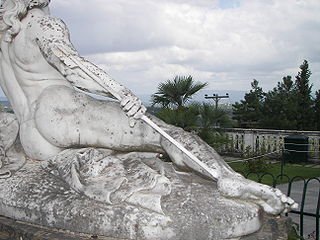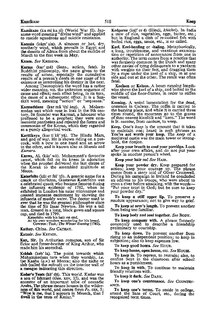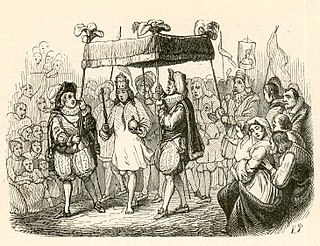 W
WAn Achilles' heel is a weakness in spite of overall strength, which can lead to downfall. While the mythological origin refers to a physical vulnerability, idiomatic references to other attributes or qualities that can lead to downfall are common.
 W
WPut on airs, also give airs, put in airs, give yourself airs. Colloquial phrase meant to describe a person who acts superior, or one who behaves as if they are more important than others. It is derived from the French word "air" - meaning appearance, and was first used in the 1500s. Variations of the phrase were used throughout the 1700s. The phrase appears in the 1911 Dictionary of French and English by John Bellows. It appears under the entry for the French word "Poseur" meaning to pose, and more specifically "poseur: a person who pretends to be what he or she is not: an affected or insincere person".
 W
WThe parable of the blind men and an elephant originated in the ancient Indian subcontinent, from where it has been widely diffused. It is a story of a group of blind men who have never come across an elephant before and who learn and imagine what the elephant is like by touching it. Each blind man feels a different part of the elephant's body, but only one part, such as the side or the tusk. They then describe the elephant based on their limited experience and their descriptions of the elephant are different from each other. In some versions, they come to suspect that the other person is dishonest and they come to blows. The moral of the parable is that humans have a tendency to claim absolute truth based on their limited, subjective experience as they ignore other people's limited, subjective experiences which may be equally true.
 W
WThe symbol of a bluebird as the harbinger of happiness is found in many cultures and may date back thousands of years.
 W
WAn idiom dictionary is a dictionary or phrase book that lists and explains idioms – distinctive words or phrases having a figurative meaning that goes beyond the original semantics of the word(s). For example, the phrase "keep your breath to cool your porridge" is more likely to be a rebuke to mind your own business than literal advice at breakfast.
 W
W"The Emperor's New Clothes" is a literary folktale written by Danish author Hans Christian Andersen, about a vain emperor who gets exposed before his subjects. The tale has been translated into over 100 languages.
 W
WIn gridiron football, an end run is a running play in which the player carrying the ball tries to avoid being tackled by running outside the end of the offensive line. It is distinct from a dive, which is a run "up the middle", or an off-tackle run, which is a run through the inside gap created by the offensive tackle. Most option offenses are based on the end run.
 W
W"'Good Day, Fellow!' 'Axe Handle!'" is a Scandinavian folktale, collected by Asbjørnsen and Moe.
 W
W"The Goose that Laid the Golden Eggs" is one of Aesop's Fables, numbered 87 in the Perry Index, a story that also has a number of Eastern analogues. Many other stories contain geese that lay golden eggs, though certain versions change them for hens or other birds that lay golden eggs. The tale has given rise to the idiom 'killing the goose that lays the golden eggs', which refers to the short-sighted destruction of a valuable resource, or to an unprofitable action motivated by greed.
 W
WA hair's breadth, or the width of human hair, is used as an informal unit of a very short length. It connotes "a very small margin" or the narrowest degree in many contexts.
 W
WIn linguistics and stylistics, an irreversible binomial, frozen binomial, binomial freeze, binomial expression, binomial pair, or nonreversible word pair is a pair or group of words used together in fixed order as an idiomatic expression or collocation. The words have some semantic relationship and are usually connected by the words and or or. They also belong to the same part of speech: nouns, adjectives, or verbs. The order of word elements cannot be reversed.
 W
WThe Monkey and the Cat is best known as a fable adapted by Jean de La Fontaine under the title Le Singe et le Chat that appeared in the second collection of his Fables in 1679 (IX.17). Although there is no evidence that the story existed before the 15th century, it began to appear in collections of Aesop's Fables from the 17th century but is not included in the Perry Index. There are popular idioms derived from it in both English and French with the general meaning of being the dupe of another. Usage of these and reference to the fable have been particularly employed in political contexts.
 W
WPandora's box is an artifact in Greek mythology connected with the myth of Pandora in Hesiod's Works and Days. He reported that curiosity led her to open a container left in care of her husband, thus releasing physical and emotional curses upon mankind. Later depictions of the story have been varied, while some literary and artistic treatments have focused more on the contents than on Pandora herself.
 W
WProverbidioms is an oil painting by American artist T. E. Breitenbach depicting over 300 common proverbs, catchphrases, and clichés such as "You are what you eat", "a frog in the throat", and "kicked the bucket". It is painted on a 45 by 67 inch wooden panel and was completed in 1975 after two years work, when the artist was 24. The included sayings are painted quite literally and appear comical and bizarre, especially if one does not at first realize what the painting is about. For example, "You are what you eat" is represented in the painting by a carrot eating a carrot. The painting also contains hidden social commentary, and a reference to Pieter Bruegel the Elder who did a painting of Dutch proverbs in the sixteenth century. The title Proverbidioms is a simple portmanteau word combining "proverb" with "idioms".
 W
WTempest in a teapot, or storm in a teacup, is an idiom meaning a small event that has been exaggerated out of proportion. There are also lesser known or earlier variants, such as tempest in a teacup, storm in a cream bowl, tempest in a glass of water, storm in a wash-hand basin, and storm in a glass of water.
 W
WTouron is a derogatory term combining the words "Tourist" with "Moron" to describe any person who, while on vacation, commits an act of pure stupidity. The term is considered park ranger slang that describes how some tourists act when entering a national park. The phrase indicates an act of ignorance and is known to be used in different subcultures. It is also used to describe tourists in general when they are outside their normal "comfort zone".